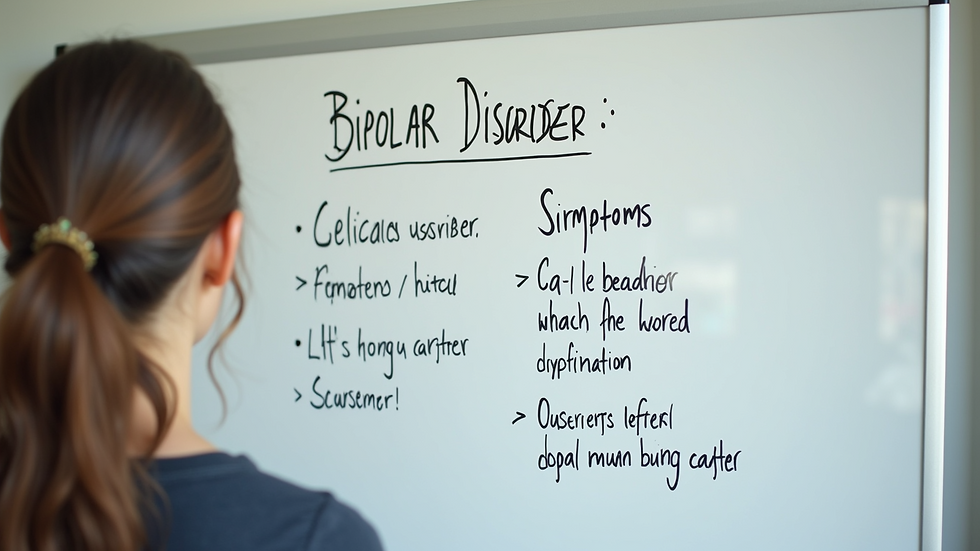How Family Therapy Can Support Bipolar Disorder Management
- Gary Smith
- Aug 5
- 4 min read
Bipolar disorder is a complex mental health condition that affects mood, energy, and daily functioning. Managing it effectively requires more than just medication and individual therapy. Family therapy plays a crucial role in supporting individuals with bipolar disorder by fostering understanding, improving communication, and creating a supportive home environment. This article explores how family therapy can be a powerful tool in managing bipolar disorder and offers practical advice for families seeking help.
The Role of Family Therapy in Bipolar Disorder Management
Family therapy involves working with the individual diagnosed with bipolar disorder and their family members. The goal is to improve relationships, reduce stress, and develop strategies to cope with the challenges of the disorder. Bipolar disorder often affects the entire family, not just the person diagnosed. Family members may experience confusion, frustration, or helplessness when trying to support their loved one.
In family therapy sessions, a trained therapist helps everyone understand the nature of bipolar disorder. This includes recognising mood swings, triggers, and the importance of medication adherence. The therapist also teaches communication skills that reduce conflict and promote empathy.
Practical benefits of family therapy include:
Education: Families learn about bipolar disorder symptoms and treatment options.
Support: Family members share their experiences and feelings in a safe space.
Problem-solving: The family develops plans to handle crises or mood episodes.
Improved communication: Techniques to express feelings and listen actively are practised.
By involving the family, therapy creates a network of support that can improve the individual’s stability and quality of life.

How Family Therapy Enhances Treatment Outcomes
Research shows that family therapy can significantly improve treatment outcomes for people with bipolar disorder. When families understand the disorder and work together, the risk of relapse decreases. This is because family members can recognise early warning signs and encourage timely intervention.
Family therapy also helps reduce feelings of isolation and stigma. Bipolar disorder can be misunderstood, leading to blame or shame within families. Therapy promotes acceptance and compassion, which strengthens family bonds.
Key ways family therapy enhances outcomes:
Early intervention: Families learn to spot mood changes and seek help quickly.
Medication adherence: Support from family encourages consistent medication use.
Stress reduction: Open communication lowers household tension, which can trigger episodes.
Crisis management: Families develop clear plans for managing emergencies.
For those searching for support, finding family therapy for bipolar disorder near me can be a vital step toward better management.

What are the 4 A's of Bipolar Disorder?
Understanding the 4 A's of bipolar disorder can help families grasp the core challenges faced by their loved ones. These four aspects highlight the symptoms and behaviours that often accompany the condition:
Affect: Refers to mood changes, including episodes of mania and depression.
Activity: Changes in energy levels and activity, such as hyperactivity or lethargy.
Attention: Difficulty concentrating or staying focused during mood episodes.
Associations: Disorganised thoughts or speech patterns that may occur during manic or depressive states.
Family therapy addresses these areas by educating family members on how these symptoms manifest and how to respond effectively. For example, during manic phases, a person may have racing thoughts and impulsive behaviour. Family members can learn to provide calm support and avoid confrontation.
By recognising the 4 A's, families become better equipped to support their loved one through mood fluctuations and maintain a stable environment.

Practical Tips for Families Engaging in Therapy
Engaging in family therapy can feel overwhelming at first, but there are ways to make the process smoother and more effective. Here are some practical tips for families:
Be open and honest: Share your feelings and experiences without fear of judgement.
Listen actively: Pay attention to what others say and validate their emotions.
Stay patient: Change takes time, and managing bipolar disorder is a long-term process.
Set clear goals: Work with the therapist to identify what you want to achieve in therapy.
Practice skills at home: Use communication and coping strategies learned in sessions daily.
Support self-care: Encourage your loved one to maintain routines, sleep well, and take medication.
Remember, family therapy is a team effort. Everyone’s participation matters, and small steps can lead to big improvements in managing bipolar disorder.
Building a Supportive Home Environment
A supportive home environment is essential for managing bipolar disorder effectively. Family therapy helps create this by fostering understanding and cooperation among family members. Here are some ways to build a positive atmosphere at home:
Establish routines: Consistent daily schedules help stabilise mood.
Create a calm space: Reduce noise and distractions to promote relaxation.
Encourage open dialogue: Make it safe to talk about feelings and concerns.
Avoid blame: Focus on solutions rather than fault-finding.
Celebrate progress: Acknowledge small victories and improvements.
By working together, families can reduce stress and create a nurturing environment that supports recovery and wellbeing.
Family therapy offers a valuable resource for those managing bipolar disorder. It strengthens family bonds, improves communication, and provides practical tools to handle the challenges of the condition. If you are looking for family therapy for bipolar disorder near me, consider reaching out to a qualified therapist who can guide your family through this journey. With the right support, managing bipolar disorder becomes a shared effort that leads to greater stability and hope.


Comments